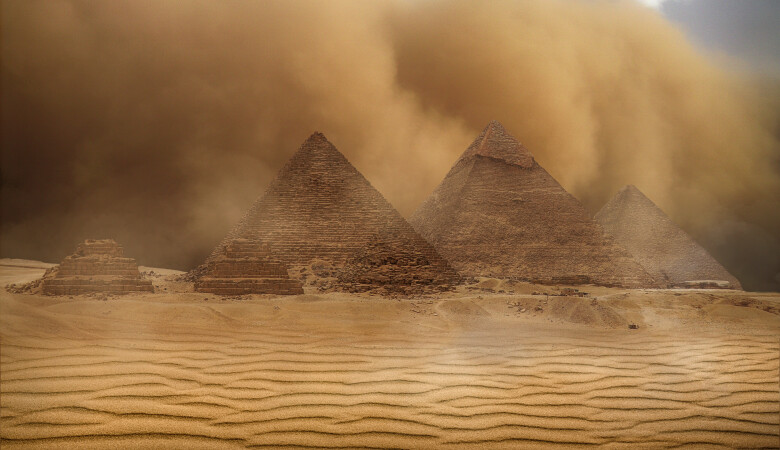The Immeasurable Majesty of Our God (Isaiah Sermon 46 of 80)
September 07, 2014 | Andy Davis
Isaiah 40:12-17
Omniscience of God, The Doctrine of God
Pastor Andy Davis preaches a verse by verse expository sermon on Isaiah 40:12-17. The main subject of the sermon is God's infinite glory, which is greater than all that is in creation.
- SERMON TRANSCRIPT -
On January 12, 2007, Joshua Bell, one of the greatest musicians in the world, the violinist, carried on a social experiment. This is a man who had recorded multiple albums and whose recordings sell millions every year, a man who books over 200 concerts annually with ticket prices in excess of $100, $150 each. This man stood incognito in a Washington, DC subway with an open violin case in front of him, holding in his hands a 1713 Stradivarius worth $3.5 million, and he played eight Bach sonatas as people bustled past and barely noticed. They probably looked on him as a step above a homeless person, played pretty well though, I guess, as they walked by, and occasionally some people would stop and listen. In all, according to the cameras that were put there, 1097 people heard him that morning, 27 put money in his violin case. The total offering was $32.17, so that's an average of a little more than a dollar for each contribution for Joshua Bell playing a Stradivarius, playing Bach music there that morning.
Now, I think that this social experiment is a parable of 7.1 billion people bustling past Almighty God and occasionally dropping a buck or two in an open violin case. Everyone there that went by, except one lady stood and she said, "I heard you at Symphony Hall last week, and you were amazing. What are you doing here?" So there was this one lady who knew who he was. I think she was glad for the free concert, she stood there for a while. I don't know if she was late to work that morning, but well worth it, well worth it. But everyone else vastly underestimated that man and his skill, vastly underestimated. But that is as nothing compared to how each and every one of us underestimates Almighty God. And if I could extend it to his incarnate Son, our Lord and Savior Jesus Christ, whom some have called God incognito, veiled in flesh, the Godhead, see, we also barely notice him, would scurry right on by. He had no beauty or majesty to attract us to him, nothing in his appearance that we should desire him, but he was as nothing to us, and we just scurry by.
And then we have, I think, before us in the text that you heard Jim read, you have a sense of what offering would be sufficient for such a God. Lebanon is not enough, all of its cedars are not enough to burn the fires and all of its animals, not enough for such an offering that would be worthy of a personage like Almighty God. And so my desire is, through the ministry of the Word today, by the power of the Spirit, to lift our hearts, our minds higher in our estimation of God, and that we would also have a greater estimation of God's provision for us and our sin, Jesus Christ. I want to have an encounter with the Living God today with you. I want to share that together, I want us to read these words and meditate on them slowly, and I want us to ponder this infinite God and have a sense of his greatness.
And my conviction is, that if we do that, as I prayed in my pastoral prayer, people all across the spectrum of earthly circumstances will be ministered to. Whether you're filled with joy and things are going really, really well for you in your life right now, or shattered by something that happened this week and don't know what the answers could possibly be, I believe a greater sense of the vision of God through this text will minister to you.
So this morning, we're going to hear some of the most exalted words in the English language, and we're going to ponder them, and we're going to look, as it were, through narrow slats in a fence and light, glory is going to stream through those slats, those narrow slats are words; nouns, verbs, adjectives, sentences, paragraphs. We're going to just see through a glass darkly, someday we'll see face-to-face. But this morning we look at a book, we look at some words, and we're going to have a sense of the greatness of God. And there's so many things that a meditation on the staggering majesty of God does for us, many things. And I'm going to talk about a good number of those, but one thing it does for me as a Christian, it guarantees the gospel of my salvation. And that's probably the most important thing we can get out of this: This great God is willing to save sinners through Jesus Christ, and how encouraging is that?
So let's talk a little about context now, we're right in the middle of a chapter in the middle of a book, this incredible book of Isaiah. We've jumped right in Isaiah 40:12-17. Last time we looked in depth at the first 11 verses, we saw there I think the timeless message of the gospel. Now, Isaiah was a prophet who lived in the 7th century and 8th century BC, and who is writing to Jews at that time who are facing certain circumstances. And we come to a hinge in the book in Isaiah 40:1-39, basically facing the Assyrian threat and all that that meant. And then at the end in Isaiah 39, we have a prophecy given to Hezekiah that some day that nation, the Jews of Judah, would be carried off into exile into Babylon. But now in these chapters, and in the first 10 chapters after that, 40-49, we're going to have repeated promises of the restoration of the Jews back to the Promised Land. They're going to be established back in the Promised Land, these exiles, to Babylon, will be reestablished, and they will be allowed to rebuild the destruction of Jerusalem and rebuild the temple, and God's going to allow them to do that.
And so that's an immediate circumstance, we'll talk a lot about that. But all of that requires the absolute sovereignty of God. First of all, none of it had happened yet. Isaiah was looking ahead across a century or more in the future to what would happen. But he was speaking, I think, immediately to that generation that hadn't even born yet to give them courage and hope that God's power was sufficient to bring them back and reestablish them in the Promised Land. They could rebuild their city and their country and resume their lives in the Promised Land. But I believe that the words of Isaiah 40 through 49 and of Isaiah 40 in particular, just soar above that immediate detail of redemptive history, it's just too big for that. It's too small a thing to just talk about the restoration of the Jews to the Promised Land. So again and again, we're going to springboard from that immediate circumstance to the gospel of Jesus Christ and what it means for every tribe and language and people and nation, and sinners like you and me. It's just too great for just that small detail.
I. The Staggering Majesty of God Guarantees the Gospel
So the big picture right away in Isaiah 40:1 and 2, God speaks a message of comfort to sinners like you and me, "Comfort, comfort My people says your God. Speak tenderly to Jerusalem, and proclaim to her their hard service or warfare has been completed, that her sin has been paid for. That she has received from the Lord's hand double for all her sins." And I said last week that yes, there was an immediate sense of fulfillment of that as the Jews would be allowed to return and their sins would be forgiven as exiles are allowed to continue. But far, far greater than that is the word that speaks to me and to you as individual sinners, that there is in Jesus, in the shed blood of Christ, an atonement infinitely greater than all of your sins. And that is incredibly comforting, isn't it? To just know that sins can be forgiven through faith in Christ.
This is a message of comfort. And it's a message that proclaims the glory of God in verse 5, it says, "The glory of the Lord will be revealed, and all flesh, all mankind together will see it for the mouth of the Lord has spoken." It's a message based on the eternal Word of God, it's based on words. All flesh, all human beings are like grass, and all of their glory and their achievement is like the grass of the field. The grass withers and the flowers fall, and the breath of the Lord blows on them, surely the people are grass. Grass withers and the flowers fall, but the Word of our God stands forever.
And so, this is a message that's been captured in words. And faith comes by hearing, and as we hear these words, we are able in verse 9, to behold our God, to see Him. We can say to the towns of Judah, 'Behold your God, look at Him.' And so we can see now, only with eyes of faith. Someday we'll see Him face-to-face, but now just with eyes of faith, so we can say, "Behold your God," as we listen to the words of this incredible chapter. So this is an incredible gospel, ultimately fulfilled in the shed blood Jesus Christ who died on the cross, in the place of sinners like you and me and who God raised from the dead on the third day. And we are told that if we put our trust in Him, turning away from our own works, repenting from our wickedness, if we trust in Christ, we will be forgiven.
And that's not all. That someday, a multitude from every tribe, and language, and people, and nation, for whom that has happened, will be gathered around the throne of Almighty God in the new heavens and the new earth, and we're going to see such beauty we can scarcely even imagine. It's going to be infinitely greater than we can put in words. It's going to far outstrip any suffering any of us went through. Says in Romans 8, "I consider that our present sufferings aren't even worth comparing with the glory that will be revealed in us." And we're going to see that glory and there will be no more death, no mourning, no crying, no pain, there will be no more warfare, no crime. Nothing but the glory of God radiating this beautiful resurrected earth as it were, you could say it that way. And we'll live there forever and ever in perfect happiness. But the world staggers through unbelief concerning this message. It can't accept it.
And it's so tragic, it's so ironic, this is the very thing the world yearns for. The very thing that it puts in its songs. I was listening to one song this week and the singer was just singing out of the emptiness of his soul and he's singing, he says, "I have a hole in my soul and I'm yearning for love and a sense of the feeling of that love. I want that, but I just can't find it anywhere." I'm preaching the gospel to the digital music. You need Jesus. And I just, you know, I don't know, maybe I'll get on his calendar, give him a call, maybe he'll return my call and we'll get some time together. Share the gospel with him, but he's just representative of this whole world that yearns for this peace and yearns for this joy and this beauty and to be there forever and no more death, mourning, crying and pain.
But then when we're told that this gospel can give it to us free of charge, that there's nothing, just as a free gift of grace, the world staggers through unbelief. I think as I've analyzed it I think it's both too good to be true and too bad to be true. I think that's what's going on, it's just too good to be true. The very things that we want, that we could live eternally in a perfect world, free from all of these ills and misery, and just live there forever, it's just too good to be true. But it's also too bad to be true because we just can't accept the basic premise that we are wicked, rebellious sinners in the sight of a holy God, and that we deserve eternal condemnation in hell. And that if we aren't saved by someone else, we will most certainly go to hell. That's just too bad to be true. And so the world staggers through unbelief and will not accept it.
I think we think too highly of ourselves and too lowly of God. And the problem at the root of all of this is we really just don't know God, we just don't know Him. We underestimate what He can do. We underestimate his goodness, and his love, and his mercy and grace. And so we stagger with unbelief at these vast promises of God. And we underestimate God's holiness and righteousness and justice, and we can't accept his appraisal of who we really are in our wickedness and rebellion. So I think we need a vision of God, we need to know who he really is, and that's what Scripture has been given to us to do. That's what Isaiah 40 does, in some ways better than any other chapter in the Bible.
Think of yourself now, think of your own patterns, your own habits. Do you not frequently think hard thoughts of God? Does that not happen to you? Do you not frequently question God? You wonder about his wisdom and allowing or permitting this or that. Do you not question God's love for you from time to time? Do you not effectively question his power in the world? Do you not put things together in this sense and wonder at events in the world and think that this or that happening prove some kind of deficiency in God, either he lacks power he lacks wisdom, or he lacks love? Something's wrong with God because of the world here that we've got.
Do you not occasionally from time to time speak disrespectfully of God, Almighty God, the one who spoke the universe into existence, the one who said, 'Let there be light,' and there is light. The one who created the sun, and the moon, and the stars; the one who destroyed the world with a flood, the one who knit you together in your mother's womb? Do you not from time to time speak disrespectful words about him and what he's doing in your life? When was the last time that you questioned God? When was the last time you challenged God? When was the last time you brought God to the bar of your justice and asked him hard questions about the things that were going on? This is our root issue, this is the reason we stagger in unbelief regarding the promises of the gospel.
We don't know God. And Jesus cried about this, cried out in John 17. "Righteous Father, the world has not known you…" It's coming from the depths of his being. They don't know you, Father. But God has locked up within these words, the words of Scripture, the power to give us faith and through that faith to give us sight in the eyes of our heart, that the eyes of our heart might be enlightened and we would know this true God, and that's a powerful thing.
And so this vision of the infinite majesty of God for me guarantees the gospel in my life. I'm able to look at it and say the things that God has promised He will most certainly do for me, and for a multitude from every nation on earth, He will do it.
II. The Stunning Immensity of God Dwarfs the Universe (vs. 12)
Secondly, the stunning immensity of God dwarfs the universe. Now, get ready for me to go absolutely geeky on you. It's going to happen for probably at least 20 minutes, but hang in there, alright? This is who I am, I can't stop being who I am, but here we go. Alright. I love science, I love engineering. And we're going to just find out just how great this God is in exponential terms. Alright, so verse 12, "Who has measured the waters in the hollow of his hand or with the breadth of his hand marked off the heavens? Who has held the dust of the earth in a basket or weighed the mountains on the scales and the hills in a balance?"
We can hardly conceive of the immensity of God. The more we stand before him in awe, in awe, the incredible immensity of God, we would be silent before Him. Our problems, such as they were, would by contrast shrink into insignificance. I really do mean for them to shrink. I don't want to minimize your problems. I know they're weighty and they're many, I know, and they hurt. But compared to such a God, they shrink and it's marvelous to ponder just what we said earlier, Immanuel, through Jesus, God, this God is with us, and he will help us. And that's so encouraging. So, he means though in all of this to humble us. God is humbling humanity here. Five times in the series of questions he's addressing to the human race, he's talking to the whole human race, he lays out five cool questions one after the other. Alright.
"Who has measured the waters of the oceans in the hollow of his hand?" Who, O human race? Have any of you puny, tiny humans been able to do that? No. Well, Almighty God has. Who of you has used his hand to mark off the dimensions of the heavens? Who? Is any human being capable of doing this? Anyone want to step forward and say they've even been close to doing this? But God has done this. Who has held the dust of the earth in a basket? Who? Do you know any human being even remotely capable of such a feat? The entire human race working together for a century couldn't achieve it, but God can do it in an instant. Who has understood the mind of the Lord? Is there any human being willing to step forward and match wits with Almighty God? Any genius scientist willing to take on the infinite mind of God? Yes, there are some really clever really bright scientists who have studied tiny aspects of what God has made and have come to new insights that are true, have written about it, and then well rewarded.
But God made what they were studying. We're just scanning God's work in small detail and getting some of it right. Who has ever instructed God or been his counselor? Now, at one level, all of us say, "I have, actually." We'll talk about that, but no one can give God advice or counsel. So you read these verses, the series of who, who, who, who, who and he's talking to us and he's meaning to humble us because we're so arrogant and he's meaning to put us in our place so that we understand how great and how immense he is.
Now, what do I mean by immense? The immensity of God? Perhaps directly related to the omnipresence of God may be hard for me to distinguish between the two. The immensity of God, it has to do with God's relationship to his physical universe. God's infinity relative to earth and outer space and everything that there is, God fills every part of his creation with every part of himself. So, everywhere you are in the universe, God is fully there. That's the omnipresence or perhaps, immensity of God fully there. Therefore there is no container for God. There's no box you can put God in where God's in here and he's not on the other side of the barrier. Solomon knew that when he made his temple. You remember the dedication of his temple in 1 Kings 8:27, he looks at this golden box that he made, this golden building. It's relatively small, but boy, it was ornate, lots of gold, lots of glitter, and he stood there looking at it, he said, "But will God really dwell on earth? Heaven, even the highest heavens cannot contain you. How much less this temple I've built?"
God is not contained by anything, he's not dwarfed by anything. Have you ever stood before something so huge that you felt yourself shrink into insignificance? Like, you go to the Half Dome at Yosemite and is about 4800 feet off the valley floor and you just feel small. You just feel small. Or the Himalayas. I've had the privilege of trekking in Nepal and they're just big, friends. And you just feel small. Or maybe it's the Grand Canyon, maybe just the ocean, you just look at something or a night sky and you just look up and you just look at the Milky Way and you think for a little while and you just feel small.
When I consider the heavens, the work of your fingers, the moon and the stars, I think, 'What am I? I'm nothing. I'm small.' So we're shrinking. And God is comparing in his immensity, comparing himself to things we can kind of relate to. He starts with the oceans, God is able to measure the waters of all the ocean, it says, with the hollow of his hand. Now this hollow of hand language, this is what's known as anthropomorphisms, God acting like a human. We are created in his image, he doesn't have physical hands or eyes, but the Bible uses that type of language to help us understand him. So if God had a hand, he could scoop the oceans in the hollow of his hand just like that. Now, imagine yourself doing this, going to some small lake, maybe where you went boating or sailing or something like that, and going to the edge and crouching down and cupping your hand and scooping some water into the hollow of your hand. Did you notice the surface of the lake going down a little bit at all?
Well, how many scoops would it take for that to happen? Well, I can just tell you, don't bother doing that. Go to a bathtub, and fill it up. Alright, two-thirds high. Normal bath size, okay? Maybe 30 gallons. Alright, I've worked all this out. This is as geeky as it's ever going to get from this pulpit, I hope. I hope. And at the rate of about one scoop every second or so, I figured it would take me 20 minutes to empty the bathtub. How many such bathtubs are there in Lake Michie? Lake Michie, maybe you've heard of it, maybe you haven't, but it supplies 35 million gallons of drinking water per day to the City of Durham, 35 million gallons a day. How long would it take me alone to empty Lake Michie? And how big is Lake Michie compared to the Atlantic or Pacific Oceans? You get the idea?
So, how much water is there on earth? I bet you are asking that question. How much water in all of the oceans and all of the seven seas? No one knows, but they estimate, that's what scientists do, they estimate. So, estimates put it at 333 million cubic miles of water. Okay, what's a cubic mile? I don't really know, but it's a mile, mile in all directions. And the cubic mile is equal to the amount of water that flows over the Niagara Falls in one month. There are 333 million of those on earth, they estimate. God is able to scoop the water in the hollow of his hand. How many of us has stood at the edge of the ocean and been amazed by just the sheer power? When we were in Japan, we went and saw during a typhoon, that's their version of a hurricane, and it was dangerous but unforgettable. And we just stood there watching the wind lashing the water, and it's just awesome and terrifying.
When Carolyn, my 18-year-old who's at Liberty now as a student, Carolyn was born in a landlocked state of Kentucky, she was born in Louisville. My other kids, all born in a state that had access to the Atlantic Ocean, but she was born in Louisville. Best that Louisville could do is the mighty Ohio River, which I knew didn't really compare. And so, we went at Christmas time, she's about 6 months old to my mother's house in Cape Cod. It just so happened that the night before, there was a vicious storm. And I knew what was up and I knew what we were going to do the next day, so I took Carolyn with me. We drove down to Nauset Beach, parked, and I held her in my arms, and we walked up the boardwalk and crested the dunes, and I wasn't watching the ocean, I was watching her face. She's 6 months old and her eyes got as big as saucers as she saw the ocean for the first time, and I was seeing it kind of for the first time through her.
And she just kept wordlessly pointing over and over, like this. It's like, "I know, I know, I see it." Actually, I wasn't seeing it but I knew what it looked like. I was looking at her, and she's just pointing with these big saucer eyes at this majestic display. I don't know what she was thinking at that point, but just the immensity, the lessons that she was getting at that point. And God is using the ocean to teach us how immense he is, or he talks about the dust of the earth, it extends to the dry land as well. Who has held the dust of the earth and to measure away the mountains and the scales or the hills in a balance? The dust of the earth is most insignificant part of it, it just flies by us on a windy hot August day, and you can feel the dust on the surface of an end table or you might be able to see it if the sunlight comes streaming down, you can just see the dust flying through, it's just not even worth counting. Who would ever count it or try to collect it?
But God knows how much dust there is on this planet, he's able to gather it and hold it in a measure and know how much dust there is. And he's also able, it says, to weigh the mountains and the hills in a balance. He's weighed them all and he knows what each of them weigh. So he knows how much Mount Everest weighs. If you were to ask Siri or Google how much this Mount Everest weigh, try it. I did, I didn't do Siri but I did Google. Any answer will begin with some of those ridiculous engineering estimates. Well, most mountains are just simply cones and off they go, okay? Height, whatever, and they come up with an estimate of, Mount Everest weighs 357 trillion pounds. Okay. I wonder if God just laughs. Actually, it's 396.4475. If you want, I can keep going and tell you all the decimal points.
God knows exactly how much each mountain and hill weighs, even the smallest hills. So, from the tiniest speck of dust flying through your living room window to the largest mountain and everything in between from the deepest ocean to the shallowest puddles, God knows what is on planet Earth. The immensity and power and knowledge of God is absolutely staggering. But God doesn't just stay on planet Earth, he goes out into the cosmos. Humanity were confined here, for the most part. The heavens soar above us and are meant to humble us, as I've already said from Psalm 8. So we look up to the night sky and we are humbled, we look up to the sun and we're humbled. We have occasionally escape Earth's gravitational pull enough to get into outer space. The furthest any human being has ever been from the surface of the Earth is Apollo 13, as they slung around the back side of the moon to get back. You've perhaps seen the movie Apollo 13, that's the furthest any human being's ever been from Earth, 248,000 miles roughly.
The next stop would be Mars over a hundred times further than that, but if you want to get serious and go star travel, that's Alpha Centauri, that's 4.3 light years away. What is that? Well, that's 100 million times further than the distance from the Earth to the moon, 100 million. What's that? Well, imagine that we have taken a baby's first step, it'd be like comparing a baby's first step to 69 trips around the equator. In fact, we haven't begun yet. And that's to the nearest star, 4.3 light years away. The Hubble Space Telescope and other cosmologists tell us the furthest is 13.7 trillion light years away, that's 4.3 compared to that big numbers, big outer space. God fills it all with every part of his being.
Now, the immensity of God compared to heaven and earth is meant to humble us and also to encourage us. It's meant to humble us. He uses things that are much bigger than us and says he's much bigger than them. That's what he's doing here. Each of these things is just much bigger than us and God is bigger than all of them. The oceans dwarf us in their sheer magnitude and their raging waves could sweep us all away in an instant if God didn't control them, but God scoops the oceans in his hand like a little child scoops water out of a bowl. The dust of the earth overwhelms us with sheer volume of its specks. They may seem limitless to us, but God knows exactly how many there are. The mountains of the earth overwhelm us with their imposing height, a massive weight, they could threaten to crush us if they start to slide down to our cities, but God has weighed them on his scales.
This infinite God is at work on your behalf. He wills to save your soul through Jesus' blood and resurrection. Be comforted, be encouraged, and don't ever question him.
III. The Inscrutable Wisdom of God Humbles Humanity (vs. 13-14)
That brings us to the inscrutable wisdom of God that humbles humanity. Look at verses 13 and 14, "Who has understood the mind of the Lord or instructed him as his counselor? Whom did the Lord consult to enlighten him? And who taught him the right way? Who was it that taught him knowledge or showed him the path of understanding?" So we have now we're shifting to the mind of God, the wisdom of God. We've looked at the magnitude of God, power but now the infinite wisdom of God on display. It was the mind of God that enabled him to craft the heavens and the earth to begin with. God created the sun, the moon, and the stars, and the Earth and set them in complex motion with various physical laws that enable life to happen on Earth.
Everything relay that God calculated the best heat for the sun to put out the best distance from the sun to the Earth for life. Everything, the best size of the moon and its gravitational effect on the Earth, figured it all out. God calculated the chemistry of water and how he made water very unique and special, how it's one of the few substances whose solid floats in its liquid. And it's a good thing because that means that rivers and oceans and things freeze from the top down, enabling life to go on below the surface of the ice, and eventually the ice to melt in the heat of the sun. God is so wise. Everything worked out. The mind of God figured out the structure of the mountains, the nature of the dust, the best depth of the ocean. Everything.
It was the mind of the Lord that figured out the complexity of your body, of your brain, of your circulatory system, of everything. Fearfully and wonderfully made are you. It was God who figured all of those things out. And the mind of God is on display, not just in all the physical universe and all the stuff there is. It's on display in the unfolding of history as well. God is very wise in unfolding history. The sequencing, how from the sin of Adam through to the point of where Jesus, in the fullness of time, was born of a virgin, who lived a sinless life, died on the cross and rose again and on through the 2000 years since. God has been unfolding history, the rise and fall of one nation after the other. Everything wisely figured out down to the smallest detail.
Now, who has understood all this? Which one of us has understood the mind of the Lord? Is anyone intelligent enough to trace all this out and comprehend it? There's not a human being on the face of the Earth whose intellectual capacities reaches 1/10th of 1 millionth of 1% of what God does. So, who has ever instructed God as his counselor? I've said this before, I love it, I think about it probably once a week, I'll say it again. Erwin Lutzer. Has it ever occurred to you that nothing has ever occurred to God? And it never will. So if nothing ever occurs to God, then you're not ever teaching God anything in your prayer life. When you kneel down to pray for a brother or sister who's going through a certain trial, for yourself, whatever, and you're starting to explain to God what's going on and starting to tell him the things that are happening, you haven't taught him a thing, and you never will. There's no aspect of history that He's not thought straight through, if we could use that kind of language as though there was an Alpha and Omega of his thinking. He just instantly got it and always has, and we are not instructing him about anything when we pray.
God knows what we need before we ask him, he has already worked everything out. That means that redemptive history is unfolding exactly as the wisdom of God has ordained. Exactly. And nothing is surprising him and nothing ever will. And so, he doesn't need any advice. And let me ask you a question, if he did need advice would he ask you? It's like, well, you know, I'm... I mean, if you were asking him advice, I'd be in the running at least among those. Do you not see how arrogant this whole thing is? First of all, God is saying in this text, I'm not asking you for any advice. There is no one here who can be my counselor. God's plan cannot possibly be improved on. I know there is suffering in this world. To us, it is incomprehensible. But God has measured everything out and is working out a spectacularly beautiful plan for his glory and for the joy of his people.
Justice is the Foundation of his Throne
No one, it says in this text, in verse 14, taught God the path of justice. Interesting phraseology here. NIV just kinda tones it down to, "taught him the right way." But other translations I think do a little bit better when they say, "taught him the path of justice." It's fascinating, and important. Many times, we sinners want to question God about his justice, don't we? Jeremiah did it. In Jeremiah 12:1, he says, "You are always righteous O Lord, when I bring a case before you yet I would speak with you about your justice." Boy, that takes some guts. "Why does the way of the wicked prosper? Why do the faithless live at ease?" It doesn't make any sense to me. I'm questioning you about your justice. Later, after Jeremiah gets his answer, God says, "If you utter worthy, not worthless, words, you will be my spokesman." So, don't question me about my justice.
Justice is the foundation of his throne, it says in Psalm 97:2. And God has made known his justice to the Earth, first in his word, in the word of God, his law is just, his word is just. This is the justice of God, the 10 Commandments and all of the moral law that's just. But we have violated God's justice by our sins, and no one taught God the path of justice and what to do about it. God worked it out before the foundation of the world. How? That he would send his Son, his sinless Son into the world as a human being and he would die under the just punishment of God for sinners like you and me. No one taught God that. God worked that out before the foundation of the world.
And so it says in Romans 3, "All have sinned and fall short of the glory of God and are justified freely by his grace through the redemption that came by Christ Jesus. God presented him as a sacrifice of atonement [propitiation], through faith in his blood. He did this to demonstrate his justice, because in his forbearance he had left the sins committed beforehand unpunished-- he did it to demonstrate his justice at the present time, so as to be just and the one who justifies those who have faith in Jesus." So, no one taught God that. No one taught God how to justify wicked people like you and me. Have you fled to Christ and trusted in him, to receive the forgiveness of your sins? Have you looked to Christ? Have you believed in him for the forgiveness of your sins? I plead with you, do it now. You've heard the gospel already multiple times, even this morning. God presented Jesus as an atoning sacrifice so that sinners like you and me can be just and righteous in his sight. But no one taught God how to do that. That was something God worked out before the foundation of the world.
IV. The Infinite Power of God Towers Over the Nations (vs. 15-17)
And the infinite power of God towers over the nations. We're going to develop this more next time, but look at verse 15, it says, "Behold, the nations are like a drop from a bucket and are accounted as dust on the scales. Behold, he takes up the coast lands like fine dust." This is the immensity of God compared to the nations. The Jews probably felt like just straw on a tidal wave of human history, they couldn't control anything. First, the Assyrians sweep in and take away the northern kingdom, then the Babylonians come in and sweep away whoever is not killed by the sword, famine, and plague; just a small remnant away to Babylon. And then, the Persians come in and destroy the Babylonians, and the King of Persia lets some of them come back, but they're living under Gentile domination. And after the Persians fall, when Alexander the Great comes in and the Greeks come in, neither they're in the Greek age.
And then the Greeks fell when the Romans swept in and destroyed their decaying empire, and they took over for hundreds of years. And then after them, eventually the barbarians and the Muslims and others have swept and dominated. And so it is, generation after generation. The nation seemed immense and powerful, organized together with military purpose. If, as one people speaking one nation, they begun to do this, God said at the Tower of Babel, "Nothing will be restrained from them." Powerful these empires, but they are like a drop from the bucket and dust on the scales to God. Isn't that encouraging? They're like nothing. We're going to talk more about this next time. But picture a farmer walking across the barnyard and he's got a bucket of water and he's bringing it to water some of his livestock, and as he walks, he's trying to be careful but a single drop sloshes out of the bucket.
Picture him putting the bucket down and weeping, and trying to get that drop back and you're like, "What is the matter with you? That's a drop from the bucket. God says, "That's what the nations are to me." Almost not worth even talking about. Or picture dust on the scales like a medieval cellar of vegetables. And he's got his scales and some woman comes and she wants to buy 2 pounds of turnips and right as he's weighing it out, she shrieks and says, "You're cheating me!" "What are you talking about?" "You didn't dust your scales first before you weighed my turnips." Like, what is the matter with you? The dust is as nothing, it's not even worth comparing. The nations are a speck of dust and God is 100-pound weight on the scales of redemptive history, wherever God weighs in, that's what happens.
Have any of you ever sought to lose weight, and you stepped on the scales with trepidation, and you want to know whether it was a good week or not, and you got the bad news that you'd actually gained half a pound that week? Have you ever thought, "Oh wait, yeah, that's right. I didn't dust the scale first." Just get off and dust it and try again, see how that goes. That's what the nations are, they're dust on the scales of history, these things that we fear so much. They're like nothing to God. And so, we need to apply this to today. Do you see the swirling events? We look at what some call extremist Islam, some others would say, "That's just what Islam is. It's what Islam has always done." It just bothers me how ignorant American politicians are of history and what the people who first believed in Islam and Muhammad did with that knowledge. Just read about it, first 200 years of Islam, find out what they did. This is what they've always done, but we don't need to be afraid, friends. Amen?
We don't need to be afraid. The nations, all of them, are like nothing. Same thing with communist China, and other nations, and ideologies, and post-Christian Europe with all of its materialism and atheism and bored, yawn at the gospel that they think is played out and doesn't really count for anything anymore. God is greater than all of the nations.
V. What Can We Possibly Offer to Such a God? (vs. 16-17)
So now, the question that's in front of us is what can we possibly offer to such a God? Look at verses 16 and 17. "Lebanon would not suffice for fuel, nor are its beasts enough for a burnt offering. All the nations are as nothing before him, they are accounted by him as less than nothing and emptiness."
So what could we poor, tiny sinners offer? Possibly offer to such a God? Even if we were not sinners. Imagine you came from some poor, tiny little kingdom and you're going to the halls of the great king and you have with you some of the finest homespun fabrics that some of the most skilled women of your community made. And as you're waiting in the antechamber, trying to even get into the sub-sub-sub guy who deals with people like you who want to see the great king, and you realize he's wearing garments that are of much better quality than the stuff you brought, finest silk, shimmering, you've never seen a fabric like it and you're looking at what you have to offer. Or perhaps you brought a bushel of carrots and they're getting ready for the big feast, which they pretty much have every night, and the produce they're hustling past is far better quality than yours. It's as nothing, you feel like I have nothing to offer.
But the problem is, actually we're not sinless, we are actually rebels. We have rebelled against this great king. What could we offer for our sins? And Isaiah says, Look, if you had all, in the Old Testament style, animal sacrificial system, if you had all of the logs of Lebanon and burn them up and had all the animals in that country, it would be insufficient. What's Joshua Bell worth? If you really knew who he was and what he was playing? What should they have offered there? Well, I guess, the ticket price is about $100. Okay, well, what's God worth? The fact is, we have nothing to offer. Nothing. And God knew it, and that's why he sent his Son.
The Lord searched, he saw that there was no one, he assessed the human race and knew that we had nothing to give. And so, his own arm worked salvation for him and his right hand sustained him and he sent his Son and he worked salvation in our place and offers it free of charge.
VI. Application
So what application? Flee to the gospel, friends. Flee and embrace this Savior. Realize you have nothing in your hands to offer. Realize that and accept the offering that God has made for you on your behalf in Jesus. And if you already have done that, I want you to just continually have an encounter with the Living God. Read over these verses later today. Read over them. Have your problem shrink compared to this great God.
I'm not minimizing them, I understand, I grieve with you, some of you going through the things you're going through. I want to talk more. We want to rejoice with those who rejoice and mourn with those who mourn. We're not minimizing but I just think a vision of a God like this can heal you, and strengthen you, and encourage you. Flee to him. Embrace him. Know that he loves you. Take your problems. Cast your burdens on him and just think this Mighty God has sent Jesus to be my good shepherd, and he will take me up in his arms, who we talked about last week, who can carry me close to his heart when I'm struggling. This is the God who loves me and who can do something for me. Trust in him. Close with me in prayer.































